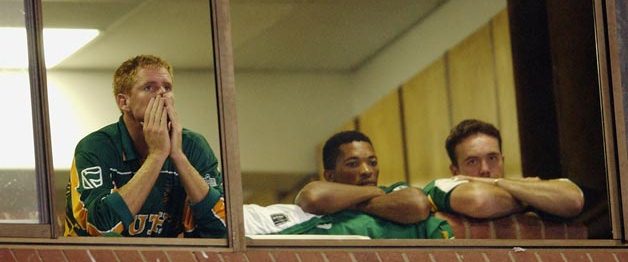World Cup Oddities #3 Messrs Boucher, Duckworth & Lewis
0By Keith Miller
It wasn’t the first time that South Africa had been come off second best in a rain affected World Cup game. The 1992 semi-final scoreboard that read “South Africa to win need 22 runs off 1 ball” is etched forever in the memory banks of most cricket watchers.
But in 2003 against Sri Lanka in Durban they only had themselves to blame.
After shock losses to the West Indians and New Zealand (also rain affected) earlier in the tournament, South Africa – one of three host nations – bounced back to hammer Kenya, Bangladesh and Canada. This left the equation simple. Beat Sri Lanka in Durban, and they would go through to the Super Sixes stage of the competition, ahead of New Zealand on Net Run Rate.
Sri Lanka won the toss and elected to bat, and the honours were about even at 90/3. But Marvan Attapatu with 124 and Aravinda da Silva with 73 steadied the ship, their partnership leading their side to a total of 268/9.
Herschelle Gibbs top scored in the South African innings with a bristling 73, sharing a positive 65 run opening stand with Graeme Smith. A series of solid partnerships, punctuated with regular dismissals, saw South Africa through to 229/6. As they approached the end of the 45th over, the rain set in.
And that is where the fun began.
Earlier, as the rain threatened, a flurry of messages was sent out to the batsmen, telling them what was required at the end of each over should the Duckworth-Lewis calculations set in.
At six wickets down, after 45 overs a total of 229 was the general consensus. Mark Boucher smacked a six off the penultimate ball of the over and punched the air in jubilation, as the target was achieved with a ball to spare. He then did what he thought was the right thing. He blocked the last ball of the 45th over to ensure no further wickets were lost. The South Africans were home!
Or so they thought.
Whilst the 45 over score of 229/6 was correctly delivered to Boucher, nobody seemed to ensure that he knew this to be the par score – not the winning score. The game had been tied, and South Africa had been eliminated from the competition.
The South African dressing room was a sorry sight as the rain hammered down, with no chance to rectify their horrific mistake.
Subsequently, much of the blame has been (somewhat unfairly) heaped on Mark Boucher for the South Africans failing to make the second round of the competition. But in reality, it was a genuine team effort. We’ll probably never know exactly what was written on the piece of paper delivered to Boucher whilst he was at the crease, but his jubilation suggested there was no mention of a par score.
As the public cried out for blood, it would be the last time Shaun Pollock captained his nation, replaced by Graeme Smith. Just prior to his departure, Pollock came up with a statement that could only be described as a massive understatement. After reflecting on the fact that this was the second consecutive World Cup where a tie would end the South Africans chances, he calmly stated:
“It’s got to rank up there as possibly the most disappointing thing”.

